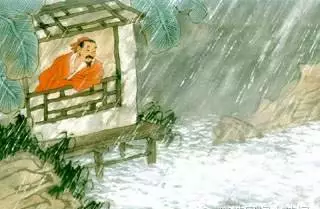
original
Night rain sent north
Don Lee Shang-yin
The return date of the king is not due,
Bashan night rain rises autumn pool.
He Dang cut the western window candle,
But when it rains at night.
Translations
You asked the return date, the return date is really difficult to say accurately, Bashan rained overnight, full of autumn ponds.
When to return, cut the candle flowers in the west window, and tell in person that the rain at Bashan night is smelly.
exegesis
1. Sending to the North: Write poems to send to people in the North. The poet was in Bashu (now Sichuan Province) at that time, and his relatives and friends were in Chang'an, so it is said to be "sending north". This poem expresses the poet's deep nostalgia for his relatives and friends.
2. Jun: The honorific title for the other party is equal to "you" in modern Chinese.
3. Return date: refers to the date of return home.
4. Bashan Mountain: refers to Daba Mountain, at the junction of southern Shaanxi and northeast Sichuan. This refers to the area around Prachuap Khiri Khan.
5. Autumn Pond: Autumn pond.
6. Ho Dang: When.
7. Total: An adverb, used before a predicate, to indicate that the action act is occurred by two or more givers. Can be translated as "together".
8. Cut the west window candle: cut the candle, cut off the burnt candle wick, so that the light is bright. Here's a long talk with candlelight late at night. "West Window Talk Rain" and "West Window Candle Cutting" are used as idioms, which are not limited to couples, but are also sometimes used to write about the longing between friends.
9. But words: back to the words, recounted.
Appreciation
The people sent in this poem are both friends and wives. The former believes that Li Shangyin's stay in Bashu was precisely when he was 39 to 43 years old when he was an aide to Liu Zhongyin, the envoy of Dongchuan Jiedu, and before that, his wife Wang Shi had died. Holders believe that Li Shangyin had already traveled to Bashu before that. It is also believed that it was sent to "relatives or friends". Judging from the warm thoughts and lingering emotions expressed in the poem, it seems that it is more appropriate to send it to the wife.
The opening question, "There is no period for the return of the king", makes people feel that this is a poem that replaces faith with poetry. Omitting a large paragraph before the poem, it can be guessed that the poet has received a letter from his wife, hoping that her husband will return to his hometown as soon as possible. Naturally, the poet naturally hopes to return home and reunite as soon as possible. However, for various reasons, the wish could not be realized for a while. The first sentence reveals the pain of parting and the cut of longing.
The second sentence, "Bashan Night Rain Rises Autumn Pond", is the poet telling his wife about the environment and mood in which he lives. The night rain on Akiyama always evokes the sorrow of leaving people, and the poet uses this scene to express his infinite thoughts about his wife. It is as if one imagines that on one autumn rainy night, the pond was filled with water, and the poet was alone in the house leaning on the bed to meditate. Thinking about the life and state of mind of his wife at home at this moment; remembering their former life together; chewing on their own loneliness.
The third and fourth sentences of "When he cut the candle in the west window together, but when it rains at night", this is the happy imagination of the future reunion. The lonely thoughts in my heart are only pinned on in the future. At that time the poet returned to his hometown and whispered with his wife under the window of the Westinghouse, and the love was long, and he did not sleep all night, so that the candles bore flowers. They cut off the flowers, and there is still an endless separation, and the joy after the reunion is endless. The poem not only describes the loneliness and suffering of listening to the autumn rain in Bashan today, but also imagines the happiness and joy of the gathering in the coming day. The pain of this time is intertwined with the joy of the future, and time and space change.
The language of this poem is simple and fluent, and the feelings are sincere. "Bashan Night Rain" repeats itself, which makes people feel angry. "He Dang" closely follows the "unending period", which effectively expresses the author's eagerness to return.